The American Chamber of Commerce (AmCham) in Cambodia recently organised an event on Cambodia’s evolving trust sector at the Hyatt Regency Phnom Penh, featuring speeches and presentations by notable figures in the field, and a panel discussion on some of the biggest questions surrounding trusts in Cambodia. We summarise the key opportunities and challenges discussed about Cambodia’s trust sector.
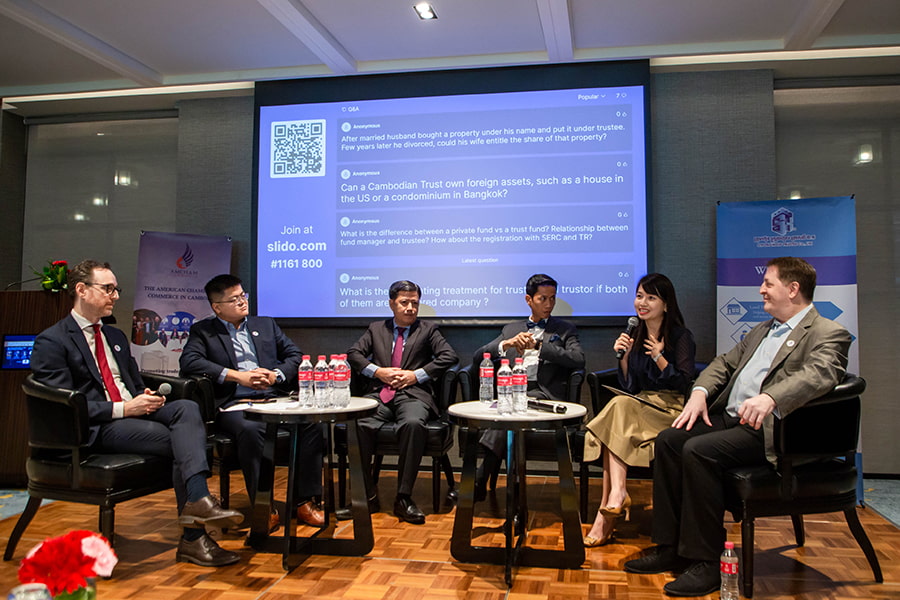
Cambodia’s Growing Trust Sector
H.E. Sok Dara, Director General of the Trust Regulator, delivered the keynote address and provided an overview of all the main developments made in Cambodia’s trust sector in recent years. He stated that the sector has been in “full operation” since February 2023 with the core and foundational regulatory framework fully established.
He also shared that there has been considerable growth recorded in the sector since the initial promulgation of the Cambodian Trust Law in 2019.
For example, in 2021 there were only 17 registered trusts in the country accounting for a total of USD $166 million in assets. As of January 2024, these numbers have rapidly risen to 810 registered cases, accounting for USD $1.29 billion worth of assets.
He also noted an increase in the number of licensed trust companies, commercial banks offering retention services, and accredited individual trustees and valuation companies.
According to Dr. Virak Prum, Chairman and Law Professor of CamEd Business School, a trust is defined as “an entity recognised by the law in which a trustee holds legal title to the property to benefit the beneficiaries who have an equitable interest in the trust property”.
Under Cambodia’s Trust Law of 2019 and Prakas No. 003 (January 26, 2023), there are five types of generic trusts:
- Public Trust;
- Commercial Trust;
- Social Trust;
- Individual Trust;
- Financing Trust (which existed before 2019 but has since been integrated into the trust law).
Benefits Of Using Trusts In Cambodia
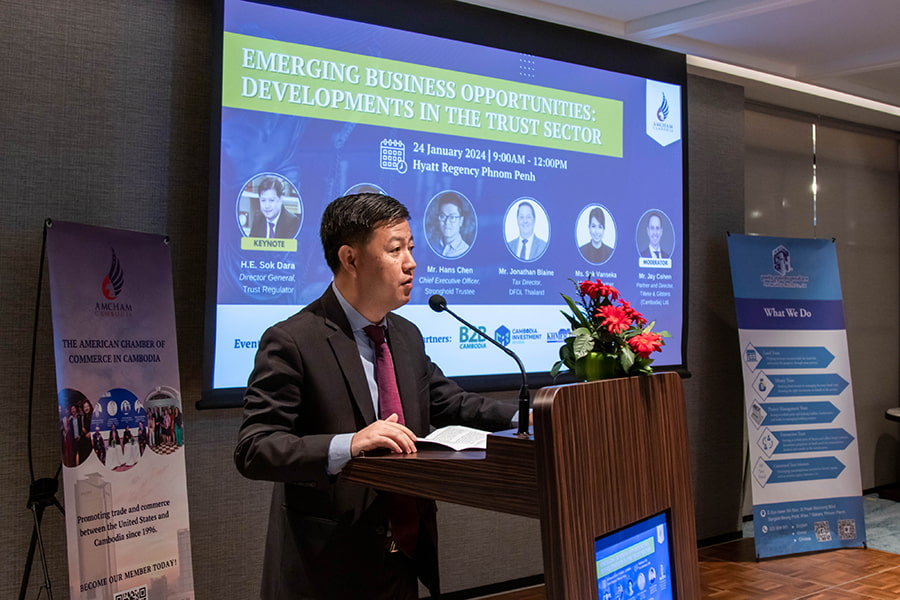
Dr. Virak described some of the benefits of trusts as:
- They can provide higher confidence to beneficiaries – e.g. a child who is benefiting from a trust established by their parent would have confidence in knowing the exact amount the trustee needs to distribute to them every payment term;
- Trusts are impartial – e.g. under an escrow account for a sale-purchase agreement, the bank acting as the escrow agent (trustee) will enforce the terms without bias to all parties;
- Trusts can support economic diversification – e.g. trusts can allow foreigners to purchase-hold properties and, therefore, bring in more foreign direct investment (FDI);
- Trusts can help to build a stronger culture of professionalism – e.g. in a trust agreement, an attorney-at-law would be eligible to receive payments held in the trust only after completing all their intended tasks for the client, hence, they would be inclined to demonstrate high professionalism and deliver results.
Trusts Are A Potentially Safer Method For Foreigners To Invest In Property In Cambodia
Hans Chen, CEO of Stronghold Trustee, also gave a presentation on ‘How Trusts Can Hep Investors’ where he made the case that trusts offer a safer option for foreigners who are seeking to invest in properties in Cambodia.
Under the Cambodian Constitution (1993) and Article 8 of the Land Law (1992), “Only natural persons or legal entities of Khmer nationality have the right to ownership of land in the Kingdom of Cambodia”, hence, foreigners have traditionally pursued these methods to invest in properties:
- Establishing a Land Holding Company (LHC) – where 51 per cent is a Cambodian share and 49 per cent is shares held by foreigners with decision-making power;
- Nominee structure – where a local individual is asked to hold the title on behalf of a foreigner, however, this is a more risky method than the LHC;
- Long-term Leasing – where foreigners can lease a property for 50, 70 or 99 years;
- Naturalisation – where foreigners acquire Khmer nationality to buy land.
Chen argued that trusts provide foreigners a safer way to invest in Cambodia, acting similarly to a nominee structure but with the secure backing of trust laws and regulation.
As a result, he said trusts can help prevent issues with nominees, allow foreigners to avoid the complexity of creating, managing and closing an LHC, avoid hidden charges as all trust fee structures are transparent, and also ensure that trustors can claim their properties back if trustees go bankrupt.
Sok Vanseka, Managing Partner at Sethalay Law Office, one of the events featured speakers during the panel discussion, concurred on the legality and greater security of trusts as compared to the other methods of investment foreigners typically pursue.
Vanseka explained to B2B Cambodia:
Actually, the arrangement of land holding companies and the nominee arrangement can be contested under the Constitution because it states that foreigners cannot own land, and the Land Law also says that if you try to mitigate your way to own land, it is not enforceable, so there is a question of whether the nominee arrangement and contract could be enforceable in court, which is a big risk everyone has to take.
“For trusts, some lawyers may say it is against the Constitution because it is still letting a foreigner own land, but it's actually not because trusts only let foreigners own the investment in the land, not the land itself,” she further clarified.
“To some extent, you can just have the right to the investment or the value of the land, but you cannot have the right to use the land, and the right to enjoy the benefit of the land, as this falls under ownership rights.”
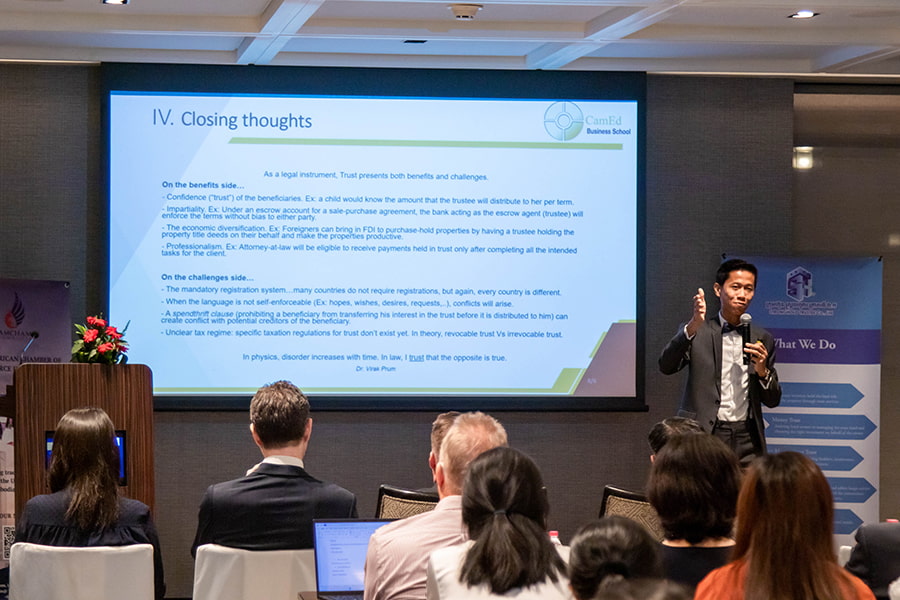
Trusts Can Help To Develop Cambodia’s Capital Markets, Support Economic Diversification
During the panel discussion, Vanseka also touched on how trusts, through the model of the collective investment scheme, can help to further develop and expand capital markets in Cambodia. She noted that the Cambodia Securities Exchange (CSX) currently has a number of bond listings that are only available to Qualified Investors while retail investors only have access to the secondary market, hence, a collective investment scheme could help to address this gap.
“If you talk about the capital market, it's about supply and demand – the supply is the issuer and the demand is the retail investor,” she said. “Trusts, those of which are considered collective investment trusts under the [regulation of the] SERC…, can fill in those two sides, meaning you can create a fund or an issue in the security market, and then you can collect through the demand of retail investors in the market. This is how trusts can develop [capital markets] and allow a group of investors to get access to the primary market or other financial instruments.”
Speaking further on how trusts can help to diversify the economy and build the alternative finance market in Cambodia, Vanseka noted benefits for both personal investments and business investments.
"[For individuals], right now, in terms of what saving and investment schemes are available, we mainly have [bank] deposits, insurance and a security market,” she said.
“When comparing [deposits in] Cambodia to other countries, the interest is high, but this is not going to be there forever, so you need to look into other investments. In terms of the security market, many probably don't have the skills needed to analyse the market. Regarding insurance, you only get the benefits when you need it. So to increase your savings and catch up with inflation, trust funds can probably be one opportunity for both high net worth retail investors and small investors.
“[On the other hand], if you want to open a business, for SMEs and so on [to get funding], they need to go to the bank… which asks for collateral, but then [it can be the case that] you don't have that collateral, so that's why you need bank money… So trusts can be another door to financing, because trusts can have fund managers who lookout for startups to invest in," Vanseka further added.
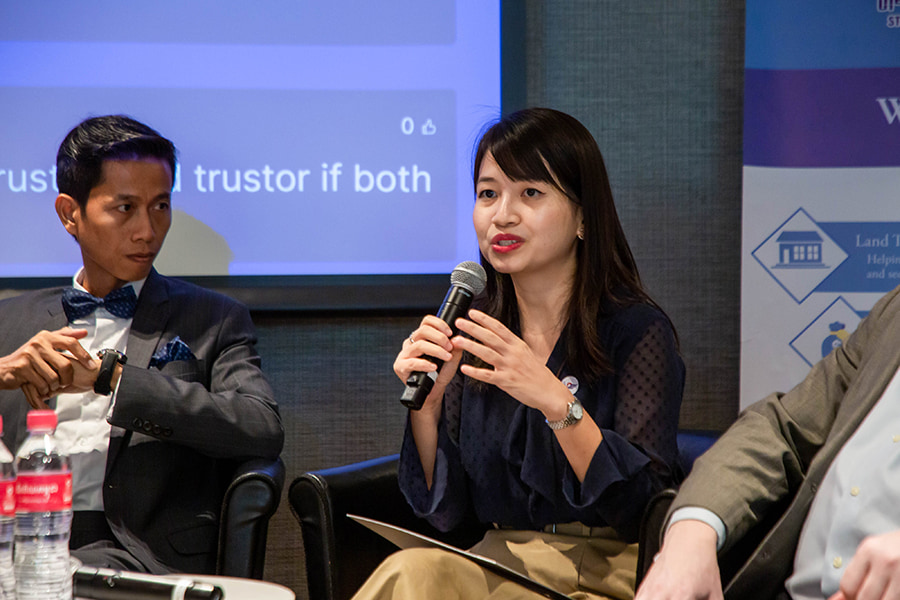
Challenges In Cambodia’s Trust Sector
Dr. Virak listed the following as some of the primary challenges related to trusts in Cambodia:
- Difficulty navigating the mandatory registration system imposed upon trustors and trustees;
- Conflicts can arise if the language used in a trust deed or contract is not self-enforceable, so care must be taken when drafting the document;
- A spendthrift clause, which would prevent the beneficiary from selling or giving away their equitable interest in a trust property, can create conflict with potential creditors of the beneficiary;
- The current tax regime for trusts in Cambodia is unclear.
Jonathan Blaine, Tax Director at DFDL Thailand, presented on the many duties of trustees and noted the three areas trustees most often make mistakes are in remaining impartial and taking into account the best interests of all beneficiaries (duty of impartiality), avoiding conflicts of interest and unknowingly overlooking miniscule compliance aspects.
He also drew attention to how complicated compliance can get when an international aspect is introduced to a trust agreement in any way, such as if a U.S. citizen enters a trust agreement.
Blaine stressed that even if the trust agreement is established in Cambodia, many U.S. laws will still apply despite being set up under a different legal regime, for example, U.S. tax filing obligations for its citizens. As a result, trustees must be very careful in monitoring all legal aspects and obligations, such as those related to tax, even on an international scale if it applies to any of the parties involved in the trust agreement.
A Need To Further Develop The Regulatory Framework For Trusts In Cambodia
Currently, Cambodia does not have a separate tax regime applied to trusts, which is a grey area all speakers agreed needs to be immediately addressed.
“In other countries there is a separate regime, classification or application of tax on trusts, like if you have to transfer your asset to a trustee, a transfer tax would apply even if the ‘owner’ is still the same, it’s just how the structure is rearranged,” said Vanseka.
Another thing to consider is the treatment of tax on income related to trusts, because the trust company holds and manages a trust for the benefit of the beneficiaries, so all the income needs would actually be transferred to the beneficiary… But since there is no tax regime for trusts yet, when the trustee or fund manager of the trust fund earns a profit, they are required to pay the standard corporate tax on income, which is 20 per cent.
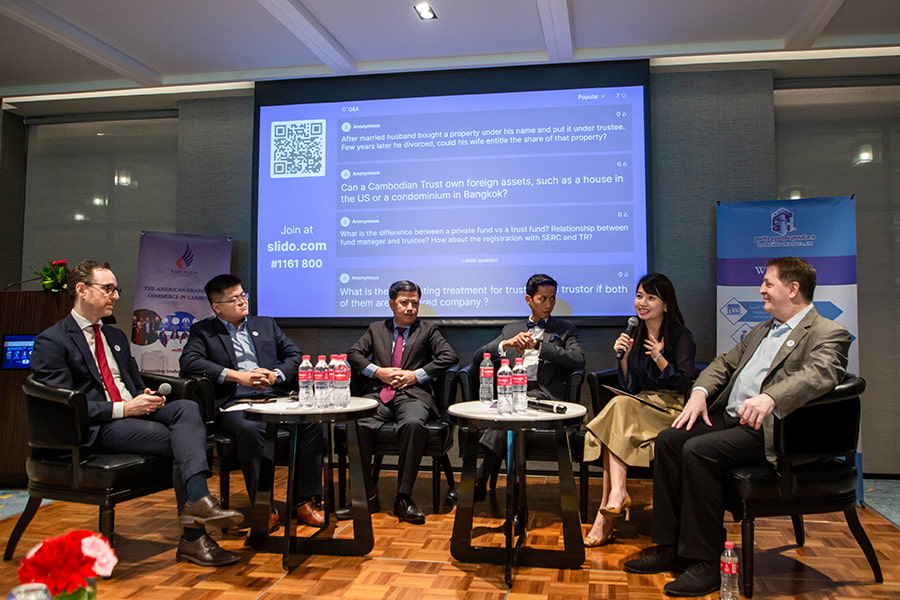
H.E. Sok Dara affirmed that the trust regulator and the General Department of Taxation (GDT) is working together to develop a separate tax regime for trusts and bolster the existing core regulatory framework in place.
Vanseka added:
Regulations need to be further developed because right now, while we have licensing regulations and supervisory regulations… we still really need to regulate in terms of having clear guidelines on specific types of trusts, because you cannot just apply one standard trust regulation on every kind of trust.
She particularly pointed out the difference between a social trust and a commercial trust to explain how one single regulatory standard can’t apply to all.
“Sometimes a social trust can be quite a small thing (e.g. a community-established social trust for the development of a pagoda), so if you apply the level of regulations needed for a commercial trust on them, it can feel like quite an unleveled market for them, so then no one will want to register a trust. Having more regulation [would help to avoid this], but rather than having more red tape regulations, we need regulations that enable the market to flow well and provide a clear guideline," Vanseka concluded.